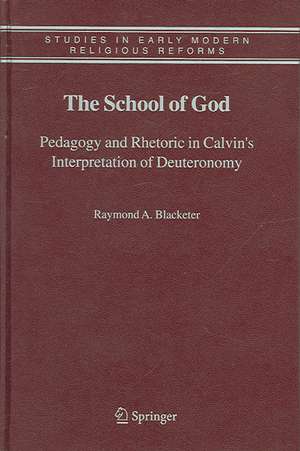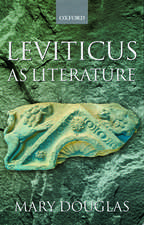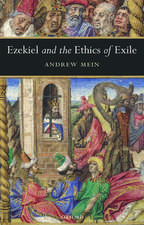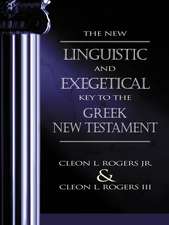The School of God: Pedagogy and Rhetoric in Calvin's Interpretation of Deuteronomy: Studies in Early Modern Religious Tradition, Culture and Society, cartea 3
Autor Raymond A. Blacketeren Limba Engleză Hardback – 13 ian 2006
| Toate formatele și edițiile | Preț | Express |
|---|---|---|
| Paperback (1) | 945.62 lei 6-8 săpt. | |
| SPRINGER NETHERLANDS – 19 noi 2010 | 945.62 lei 6-8 săpt. | |
| Hardback (1) | 951.47 lei 6-8 săpt. | |
| SPRINGER NETHERLANDS – 13 ian 2006 | 951.47 lei 6-8 săpt. |
Preț: 951.47 lei
Preț vechi: 1160.32 lei
-18% Nou
Puncte Express: 1427
Preț estimativ în valută:
182.08€ • 197.72$ • 152.95£
182.08€ • 197.72$ • 152.95£
Carte tipărită la comandă
Livrare economică 22 aprilie-06 mai
Preluare comenzi: 021 569.72.76
Specificații
ISBN-13: 9781402039126
ISBN-10: 1402039123
Pagini: 316
Ilustrații: XVII, 299 p.
Dimensiuni: 155 x 235 x 23 mm
Greutate: 0.62 kg
Ediția:2006
Editura: SPRINGER NETHERLANDS
Colecția Springer
Seria Studies in Early Modern Religious Tradition, Culture and Society
Locul publicării:Dordrecht, Netherlands
ISBN-10: 1402039123
Pagini: 316
Ilustrații: XVII, 299 p.
Dimensiuni: 155 x 235 x 23 mm
Greutate: 0.62 kg
Ediția:2006
Editura: SPRINGER NETHERLANDS
Colecția Springer
Seria Studies in Early Modern Religious Tradition, Culture and Society
Locul publicării:Dordrecht, Netherlands
Public țintă
ResearchCuprins
Acknowledgements. Abbreviations. Introduction: Calvin’s Old Testament Exegesis in Context.- 1: L’École de Dieu. Pedagogy from the Pulpit. Preaching and Pedagogy in Calvin’s Vision of a Godly Society.- 2: Ample Preaching. The Rhetoric of Calvin’s Sermons.- 3: Calvin’s Sermons on Deuteronomy. A Course in Remedial Education.- 4: Calvin’s Pedagogically Correct Commentary On Moses’ Perfect History. Improving on Perfection.- 5: Calvin on the Fourth Commandment. The Rhetoric of Rest.- 6: Calvin on Deuteronomy 10:1-2. Smooth Stones, Teachable Hearts.- 7: Calvin on Deuteronomy 21:18-21. The Case of the Incorrigible Son. Conclusion. Bibliography. Index.
Recenzii
"This study is an important contribution to Calvin research, especially because of the profound way in which Blacketer takes notice of Calvin's interpretation of Deuteronomy. [...] Those who start by taking notice of the author's conclusions, will read this valuable study with all the more interest."
Wulfert de Greef, www.calvijnstudie.nl
Wulfert de Greef, www.calvijnstudie.nl
Textul de pe ultima copertă
This study examines Jean Calvin’s attempt to nurture a godly society and further his vision of ecclesiastical and societal reform by means of sound pedagogy and persuasive rhetoric. The focus of this work is Calvin’s interpretation of the latter Pentateuch, and particularly the book of Deuteronomy. The author examines Calvin’s exegesis and rhetoric in his commentary on the latter Pentateuch, as well as the sermons that Calvin preached on Deuteronomy—material that has received little scholarly attention. Calvin’s interpretations are compared with the preceding exegetical tradition and with his contemporaries, and always considered in the contexts of the early modern interest in classical rhetoric and that of the reform of church, theology, and society in Switzerland and beyond. Commonly held assumptions about Calvin’s methodology, such as his alleged aversion to rhetoric and the scholarly fixation on his laconic style, are challenged, nuanced, and corrected.
Because of its fresh, contextual approach to Calvin’s thought, this study will be an important resource for students of the history of exegesis as well as for Calvin scholars, and it will appeal to seminary as well as university students.
Because of its fresh, contextual approach to Calvin’s thought, this study will be an important resource for students of the history of exegesis as well as for Calvin scholars, and it will appeal to seminary as well as university students.
Caracteristici
Offers a new and corrective perspective on Jean Calvin's use of rhetoric in his theological and homiletic work, focusing on the early modern revival of classical rhetoric, rather than psychoanalyzing the Reformer of Geneva Firmly grounds Calvin's biblical exegesis in the contexts of the broader Christian exegetical tradition, the revival of rhetoric in early modern Europe, and the political tensions surrounding the religious reforms of the sixteenth century Opens a unique window into Calvin's exegetical method and sheds light on the different rhetorical and pedagogical approaches between his commentaries and his sermon Provides deeper insight into how Calvin understood the Old Testament, integrated it into his understanding of Christian theology, and applied it to the practical concerns of everyday life in sixteenth century Geneva Provides evidence of Calvin's development as an interpreter of the biblical text, and as a theologian, demonstrating the integral relationship between Calvin's exegetical work and his Institutes of the Christian Religion as the repository of his theological commonplaces

















